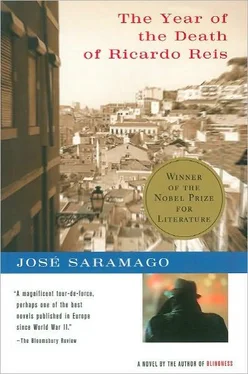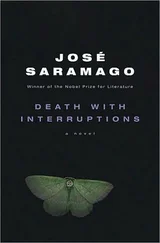José Saramago - Year of the Death of Ricardo Reis
Здесь есть возможность читать онлайн «José Saramago - Year of the Death of Ricardo Reis» весь текст электронной книги совершенно бесплатно (целиком полную версию без сокращений). В некоторых случаях можно слушать аудио, скачать через торрент в формате fb2 и присутствует краткое содержание. Год выпуска: 1992, ISBN: 1992, Издательство: Houghton Mifflin Harcourt, Жанр: Современная проза, на английском языке. Описание произведения, (предисловие) а так же отзывы посетителей доступны на портале библиотеки ЛибКат.
- Название:Year of the Death of Ricardo Reis
- Автор:
- Издательство:Houghton Mifflin Harcourt
- Жанр:
- Год:1992
- ISBN:9780547546926
- Рейтинг книги:4 / 5. Голосов: 1
-
Избранное:Добавить в избранное
- Отзывы:
-
Ваша оценка:
- 80
- 1
- 2
- 3
- 4
- 5
Year of the Death of Ricardo Reis: краткое содержание, описание и аннотация
Предлагаем к чтению аннотацию, описание, краткое содержание или предисловие (зависит от того, что написал сам автор книги «Year of the Death of Ricardo Reis»). Если вы не нашли необходимую информацию о книге — напишите в комментариях, мы постараемся отыскать её.
Year of the Death of Ricardo Reis — читать онлайн бесплатно полную книгу (весь текст) целиком
Ниже представлен текст книги, разбитый по страницам. Система сохранения места последней прочитанной страницы, позволяет с удобством читать онлайн бесплатно книгу «Year of the Death of Ricardo Reis», без необходимости каждый раз заново искать на чём Вы остановились. Поставьте закладку, и сможете в любой момент перейти на страницу, на которой закончили чтение.
Интервал:
Закладка:
Ricardo Reis returned to his office, drew back the curtain. Marcenda still had not reached the bottom of the stairs. The shadows of twilight enshrouded the square. The pigeons were nestling on the uppermost branches of the elm trees, as silent as phantoms, or else it was the shadows of the pigeons that had perched on those very branches in years gone by, or perched on the ruins that once stood here, before the ground was leveled in order to build the square and erect the statue. Now, crossing the square in the direction of the Rua do Alecrim, Marcenda turns around to see if the pigeon is still perched on the arm of Camoes, and between the flowering branches of the linden trees she catches a glimpse of a white face behind a windowpane. If anyone witnessed these movements he would not have understood their meaning, not even Carlota, who had concealed herself under the stairs to spy, suspecting that the visitor would return to the office to converse to her heart's content with the doctor. Not at all a bad idea, but it never even occurred to Marcenda, and Ricardo Reis never got around to asking himself if that was the reason he stayed behind.
...
A few days later a letter arrived, the same pale violet color, the same black postmark, the unmistakable handwriting, angular because the sheet of paper is not held in place by the other hand. There is the same long hesitation before Ricardo Reis finally opens the envelope, the same jaded face, and the same words, What a fool I was to visit you, it won't happen again, we will not see each other anymore, but believe me, I will never forget you as long as I live, if things had been different, if I had been older, if this incurable arm, yes, the specialist finally admitted that there is no cure, that the sun-lamp treatment, the electric shocks, and massage were a waste of time, I suspected as much, I did not even weep, it is not myself I pity but my arm, I nurse it as if it were a child that will never leave the cradle, I stroke it as if it were a small stray animal found abandoned on the street, my poor arm, what would become of it without me, and so farewell, dear friend, my father continues to insist that I go to Fatima and I have decided to go, just to please him, if this is what he needs to ease his conscience and convince him that it is the will of God, for we can do nothing contrary to the will of God and should not try, I am not asking you to forget me, my friend, on the contrary, I hope you will think of me every day, but do not write, I will make no more visits to the poste restante, now I must close, I have said all I had to say. Marcenda does not write in this manner, she observes all the rules of syntax and punctuation, it is Ricardo Reis who jumps from line to line in search of the essential, ignoring the texture of her phrasing. The exclamation marks are his, the sudden breaks that make for eloquence, but though he read the letter a second and third time, he learned no more, because he had read everything, just as Marcenda had said everything. A man receives a sealed letter as his ship leaves port, and opens it in midocean. There is nothing except sea and sky and the deck on which he is standing, and the letter says that from now on there will be no more ports of refuge for him, no more uncharted lands to discover, no destination, nothing left for him but to navigate like the Flying Dutchman, hoist and furl the sails, man the pump, mend and sew, scrape away the rust, and wait. Still holding the letter, he goes to the window and sees Adamastor, the two old men seated in the giant's shadow, and he asks himself if his disappointment is genuine, not playacting, if he truly believed he was in love with Marcenda, if in his heart of hearts he ever really wanted to marry her, or whether all this might not be the banal effect of loneliness, the simple need to believe that there are some good things in life, love, for example, that happiness which unhappy people are continually talking about, if happiness and love are possible for our Ricardo Reis, or for Fernando Pessoa, if he were not dead. There is no doubt that Marcenda exists, this letter was clearly written by her, but Marcenda, who is she, what is there in common between the girl seen for the first time in the dining room of the Hotel Bragança, when she was a stranger to him, and this Marcenda whose name and person now fill the thoughts and feelings and words of Ricardo Reis. Marcenda is a place of anchorage. What was she then, what is she now, a wake on the surface of the sea that disappears once the ship has passed, there is still some spray, the churning of the rudder, I have passed through the spray, what thing has passed through me. Ricardo Reis reads the letter one more time, the closing paragraph, where she writes, Do not write to me, and tells himself that of course he will write, to say who knows what, he will decide later, and if she keeps her promise, then let the letter sit at the poste restante, the important thing is to write. But then he remembers that Doctor Sampaio is well known in Coimbra, a notary is always a prominent figure in society, and post offices are staffed, as everyone knows, by many conscientious and loyal employees, so it is not at all impossible that the secret letter will find its way to his residence, or worse still, to his office, provoking outrage. He will not write. In this letter he would have put all the things he never got around to saying, not in the hope of changing the course of events but in order to make it clear that those events are so numerous that even saying everything about them will not change their course. Yet he would have liked at least to let Marcenda know that Doctor Reis, the man who kissed her and asked her to marry him, is a poet and not just an ordinary general practitioner acting as locum tenens for an indisposed specialist in diseases of the heart and lungs, and not a bad locum tenens either, despite his lack of scientific training, for there is no evidence that the mortality rate has risen since he came into the practice. Imagine Marcenda's surprise if he had said to her at the outset, Did you know, Marcenda, that I am a poet, in the casual tone of one who does not attach any great importance to his talent. Naturally she would realize that he was being modest, she would be flattered that he took her into his confidence, would look at him with romantic tenderness, How wonderful, how fortunate I am, I can now see what a difference it makes to be loved by a poet, I must ask him to read me his poems, I feel certain he will dedicate some to me, a common habit among poets, who are much given to dedications. Ricardo Reis, to avoid any eventual outbursts of jealousy, will explain that the women Marcenda finds mentioned in his poems are not real women, only lyrical abstractions, fictions, imaginary interlocutresses, if one can give the name of interlocutress to one who has no voice. A poet does not ask that his muses speak, only that they exist, Neaera, Lydia, Chloe. There's a coincidence for you, that after writing poems for so many years to an anonymous, ethereal Lydia I should come across a chambermaid with this name, only the name, in all other respects there is no resemblance whatsoever. Ricardo Reis explains, and then explains a second time, not because the matter is so very complicated but because he is apprehensive about the next step, which poem will he choose, what will Marcenda say when she hears it, what will be the expression on her face, she might ask to see with her own eyes what she has heard him read, then read the poem herself in a low voice, In a changing, uncertain confluence, as the river is formed by its waves, so contemplate your days, and if you see yourself pass as another, be silent. He reads it, reads it a second time, he sees from her face that she understands, perhaps some memory has helped her, the memory of those words he spoke in the consulting room the last time we were together, about a man who sits on a riverbank watching what the water carries past, waiting to see himself going past with the current. Clearly there is a difference between prose and poetry, that is why I understood it so well the first time and now find myself struggling to understand it. Ricardo Reis asks her, Do you like it, and she says, Oh, very much. There could scarcely be a more gratifying response, but poets are eternally dissatisfied, this one has been told everything a poet could wish to hear, God Himself would be delighted to hear such praise for the world He created, Ricardo Reis, however, looks gloomy and sad, an Adamastor who cannot wrench himself free of the marble in which he has been trapped by fraud and deception, his flesh and bones transformed into stone, his tongue likewise. Why have you become so quiet, Marcenda asks, but he does not answer.
Читать дальшеИнтервал:
Закладка:
Похожие книги на «Year of the Death of Ricardo Reis»
Представляем Вашему вниманию похожие книги на «Year of the Death of Ricardo Reis» списком для выбора. Мы отобрали схожую по названию и смыслу литературу в надежде предоставить читателям больше вариантов отыскать новые, интересные, ещё непрочитанные произведения.
Обсуждение, отзывы о книге «Year of the Death of Ricardo Reis» и просто собственные мнения читателей. Оставьте ваши комментарии, напишите, что Вы думаете о произведении, его смысле или главных героях. Укажите что конкретно понравилось, а что нет, и почему Вы так считаете.












